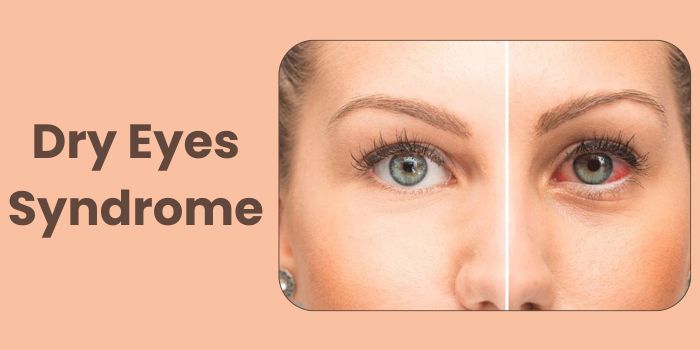Dry Eyes Syndrome is a common yet often overlooked condition that affects millions of people across the world. It occurs when your eyes do not produce enough tears or when the quality of tears is inadequate, leading to inflammation and discomfort. While it might seem like a minor issue at first, chronic dry eyes can significantly impact your vision and quality of life if left untreated. According to Dr. Vasundhara Kulkarni at Iris Eye Care, early diagnosis and personalized care are key to managing this condition. For those seeking expert care, a visit to a trusted Eye Clinic in Moshi can help manage this condition effectively.
What is Dry Eyes Syndrome?
Dry Eyes Syndrome, also known as keratoconjunctivitis sicca, occurs when the tear film – a thin layer of moisture that protects the eye – is disrupted. This film is essential for clear vision, nourishment of the eye’s surface, and protection from environmental irritants. When this layer becomes unstable, the eyes can become dry, irritated, and inflamed.
Common Causes of Dry Eyes
There are several underlying factors that contribute to Dry Eyes Syndrome. These include:
-
Aging
As we age, tear production tends to decrease, especially in individuals over the age of 50. This makes older adults more prone to dry eyes. The aging process also affects the quality of tears, reducing their ability to lubricate the eyes effectively. -
Environmental Factors
Exposure to wind, dry air, smoke, or screen time for long hours can lead to rapid evaporation of tears. Air-conditioned or heated environments further worsen the dryness, especially in office settings. -
Hormonal Changes
Women are more likely to experience dry eyes due to hormonal changes during pregnancy, menopause, or while taking birth control pills. Estrogen and androgen imbalances can impact tear gland function. -
Medical Conditions
Diseases such as diabetes, thyroid disorders, rheumatoid arthritis, and lupus can affect tear production. These autoimmune or systemic illnesses often disrupt the normal functioning of tear glands. -
Medications
Certain medications like antihistamines, antidepressants, and blood pressure drugs can reduce tear secretion. Chemotherapy and acne treatments like isotretinoin are also known to cause dryness. -
Contact Lens Use
Wearing contact lenses for extended periods can disrupt the tear film, causing dryness and discomfort. Improper lens hygiene or sleeping in lenses may aggravate symptoms further.
Recognizing the Symptoms
The symptoms of dry eyes may vary from person to person, but some common signs include:
-
Persistent dryness, itching, or burning in the eyes
-
A gritty or sandy sensation
-
Redness and irritation
-
Blurry vision that improves with blinking
-
Watery eyes as a reflex to dryness
-
Light sensitivity
-
Difficulty wearing contact lenses
-
Eye fatigue, especially after reading or using screens
If you experience any of these symptoms consistently, it’s time to consult an ophthalmologist. A visit to a well-equipped Eye Clinic in Moshi can help in diagnosing the condition accurately and beginning the right treatment.
How is Dry Eyes Syndrome Diagnosed?
Diagnosis involves a detailed history and specialized eye exams. Some of the tests include:
-
Schirmer’s Test: Measures tear production using a special strip of paper.
-
Tear Break-Up Time (TBUT): Determines how quickly tears evaporate from the eye surface.
-
Fluorescein Staining: Highlights dry spots on the cornea and conjunctiva.
-
Meibomian Gland Evaluation: Assesses the oil-producing glands in your eyelids.
Effective Treatment Options
The treatment of Dry Eyes Syndrome focuses on restoring a healthy tear film and managing underlying causes. Options include:
1. Artificial Tears and Lubricating Drops
Over-the-counter lubricating eye drops are often the first line of defense. They provide temporary relief by mimicking natural tears.
2. Prescription Medications
For moderate to severe cases, eye doctors may prescribe anti-inflammatory eye drops such as cyclosporine (Restasis) or lifitegrast (Xiidra).
3. Warm Compress and Eyelid Hygiene
Applying a warm compress and gently cleaning the eyelids can improve oil secretion from the Meibomian glands, enhancing tear quality.
4. Punctal Plugs
Tiny devices inserted into the tear ducts to block drainage, thus keeping more natural tears on the eye surface.
5. Lifestyle Changes
Reducing screen time, using a humidifier, wearing wraparound sunglasses outdoors, and taking breaks during reading or computer work can all help prevent tear evaporation.
6. Omega-3 Supplements
Dietary supplements rich in omega-3 fatty acids (like fish oil) may improve tear production and reduce inflammation.
7. Advanced Therapies
In severe cases, treatments like intense pulsed light therapy (IPL), serum eye drops, or scleral lenses may be recommended by specialists.
Why Early Treatment is Important
Ignoring dry eyes can lead to more serious complications such as corneal ulcers, eye infections, or vision disturbances. Timely diagnosis and treatment can protect your eye health and improve daily comfort.
Expert Care at Iris Eye Care
At Iris Eye Care, we understand how disruptive dry eyes can be. The clinic offers comprehensive eye examinations, the latest diagnostic tools, and personalized treatment plans tailored to your specific needs. Whether it’s mild dryness or chronic discomfort, patients receive compassionate and evidence-based care every step of the way.
As a leading Eye Clinic in Moshi, Iris Eye Care is committed to improving your eye health with a holistic approach. With expert guidance from experienced ophthalmologists and access to modern treatments, patients can look forward to clearer, more comfortable vision.
Dry Eyes Syndrome might seem like a simple issue, but its impact on vision and quality of life can be profound. Thankfully, with the right diagnosis and timely treatment, it is highly manageable. If you’re experiencing persistent eye discomfort, don’t delay seeking care. Visit a reputed Eye Clinic in Moshi like Iris Eye Care and consult Dr. Vasundhara Kulkarni for expert evaluation and advanced treatment options. Taking care of your eyes today can prevent bigger problems tomorrow.




